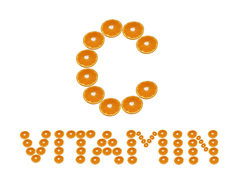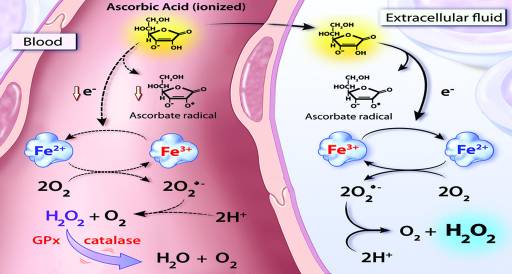 Vitamin C is a commonly used vitamin therapy in alternative and complementary cancer treatment. It has various functions in the human body, but 2 distinct modes action have been identified when it comes to cancer therapy. When it comes to cancer prevention, vitamin C has antioxidant effects that protect key cellular functions and structure. It also prevents the formation of dangerous cancer causing compounds. The dose to achieve an antioxidant effect is low (under 5g) and is achievable by dietary intake or oral supplementation. The second mechanism of action is actually a pro-oxidant effect. This is the little know but powerful anti-cancer mechanism of vitamin C. Doses above 15g have been shown to have a “pro-oxidant” effect by generating hydrogen peroxide, which selectively destroys cancer cells. These high doses are only possible through intravenous therapy since oral supplements are limited by absorption in the digestive tract. High doses of vitamin C are delivered to the areas surrounding the tumor because the vitamin C molecule looks similar to a sugar molecule and cancer cells have an increased demand for sugar to fuel their unregulated growth. When in the area surrounding the cells, the vitamin C molecule reacts with transition metals such as iron or copper and forms a hydrogen peroxide molecule that damages the cancer cell. The picture below shows the formation of the hydrogen peroxide molecule outside the cancer cell. One proposed idea on why cancer cell are particularly vulnerable to hydrogen peroxide is that they don’t have the enzyme catalase to break it down. Click here for more information on intravenous vitamin C cancer therapy and integrative cancer care. References: Chen Q, Espey MG, Sun AY, Pooput C, Kirk KL, Krishna MC, Khosh DB, Drisko J, Levine M. Pharmacologic doses of ascorbate act as a prooxidant and decrease growth of aggressive tumor xenografts in mice. Proc Natl Acad Sci U S A. 2008 Aug Chen et al. Ascorbate in pharmacologic concentrations selectively generates ascorbate radical and hydrogen peroxide in extracellular fluid in vivo. Proc Natl Acad Sci U S A. 2007 May 22;104(21):8749-54.
1 Comment
Anonymous
12/8/2015 10:46:16 pm
My friend is suffering from pituitary macroadenoma, a kind of benign brain stem tumor. Can IV vitamin C be of any help in this?
Reply
Leave a Reply. |
Welcome To My Blog
My goal is to post thought-provoking and informative articles so you can learn and apply the latest news from the world of natural health. Feel free to post comments and start a conversation. Stay tuned to my twitter and facebook feeds for the latest posts.
Archives
December 2015
|


 RSS Feed
RSS Feed

